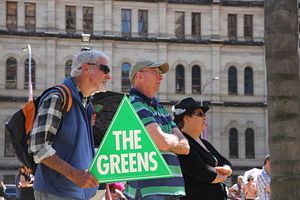Australia goes to the polls today. It is a tight race between the two major parties, although the ruling Coalition is favored to remain in power. Meanwhile, Australia’s third party, the Greens have been growing and have finally began expanding their foreign policy plans.
Security studies have come a long way from traditional realist precepts. Human security, food security and environmental security are all considered legitimate themes studied by governments across the world. Climate change represents a security threat. Yet, still, to really be serious about foreign policy, traditional “hard” security issues must be discussed by a politician. This is why in May Australian Greens leader Richard DiNatale addressed the Lowy Institute in Sydney, and over more than the central tenet of Green politics: the environment.
That DiNatale is addressing foreign policy think tanks shows that the Greens are becoming a more “legitimate” party, and their politics are expanding also. They put out their first foreign policy resolution 22 years ago (on East Timor at a time when few were interested), but since then have only offered another 14, all on nations rather than Australian security policy. However they do have a nine-point Principle list and now a stated U.S.-skeptic stance. Are they a new or third way? Not yet, but there is some refreshing difference at least.
Between Labor and the Liberals there has always been more consensus on foreign issues than domestic ones, unsurprisingly. Both favour the U.S. alliance (ANZUS) and see the value of trade with China, though disagree over some articles of the free trade agreement (Labor worries for Australian jobs, as we have previously reported). Neither has a position on sovereignty in the South China Sea, but both want to see arbitration and the rule of law upheld. In other words, they like the status quo, with minor differences (Labor, especially under Kevin Rudd was more in favour of international organisations, though Foreign Minister Julie Bishop certainly enjoyed her time at the UN Security Council).
The Greens have made the UN and its laws a pretty central part of their foreign policy platform. It’s a very moralist policy (I’m not the first to point that out). Point one sets that out clearly: “Australia must act diplomatically to promote peace, democracy, ecological sustainability, equity and justice, and human rights.” and number two would send your tough zero-sum realist staggering off for a choking fit: “Australian foreign policy should benefit both the Australian people and the people of the countries with which we engage.”
That is cynical, when the Green worldview is anything but, and even the major parties would argue Australian foreign policy is, and should be, beneficial internationally. The repetitious vaunting of norms and values of the DWP in February showed that. Yet the Greens prefer their shoulds to a more firm will.
Where they do differ is over the view of the U.S. alliance, something leader Richard DiNatale believes has dragged Australia into bloody wars (like Iraq). Few in Australia truly value cutting ties with the U.S. but that the parameters within which we engage could use a change more friendly to Australian interests and a greater, but more independent role, in any pivot to Asia is not an uncontroversial view. Senator DiNatale’s views are not “extremist” as some in Australia’s conservative press may imagine, but they do seem a little narrow. Better to suggest how to work with what we have?
What else? In his Lowy speech he apparently took the view that the South China Sea was just a new battleground between the world’s two major powers and that Australia should be more involved in arbitration (Australia is pro-arbitration) than anything militaristic. That’s not so far off the current lie of the land, in fact.
He has also said that global warming is a greater threat than terrorism. This may not be news to many, and differs from the gung-ho prosecution of anti-terrorist goals (especially under Tony Abbott’s leadership), but is not mentioned in the party’s nine-point list, though the environment does come up. Traditional security dialogue and plans are central to any serious party’s platform, and a change from a vaunting of the U.S. alliance is a point of difference, but a party with a strong security aspect to climate change that could explain it to the public: Wouldn’t that be new?

































